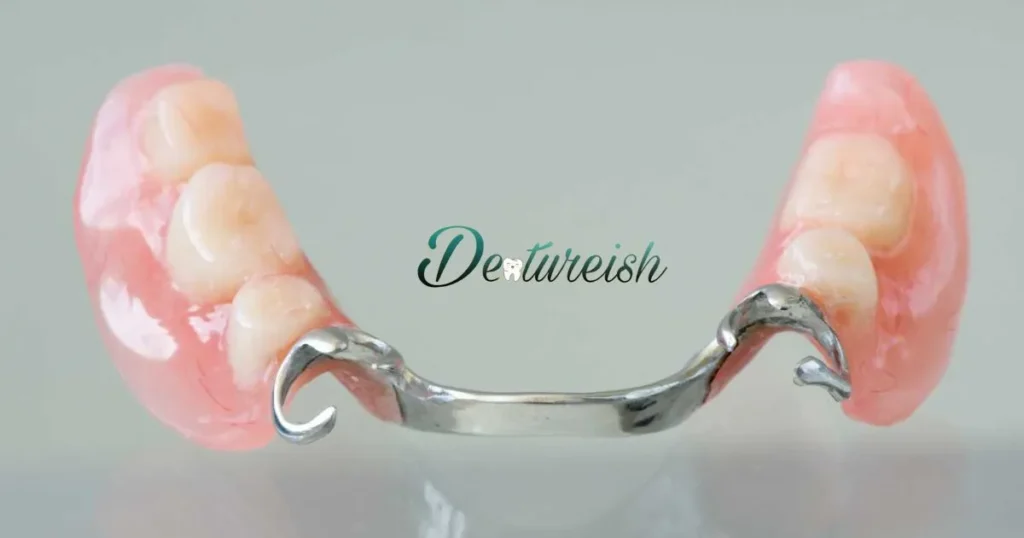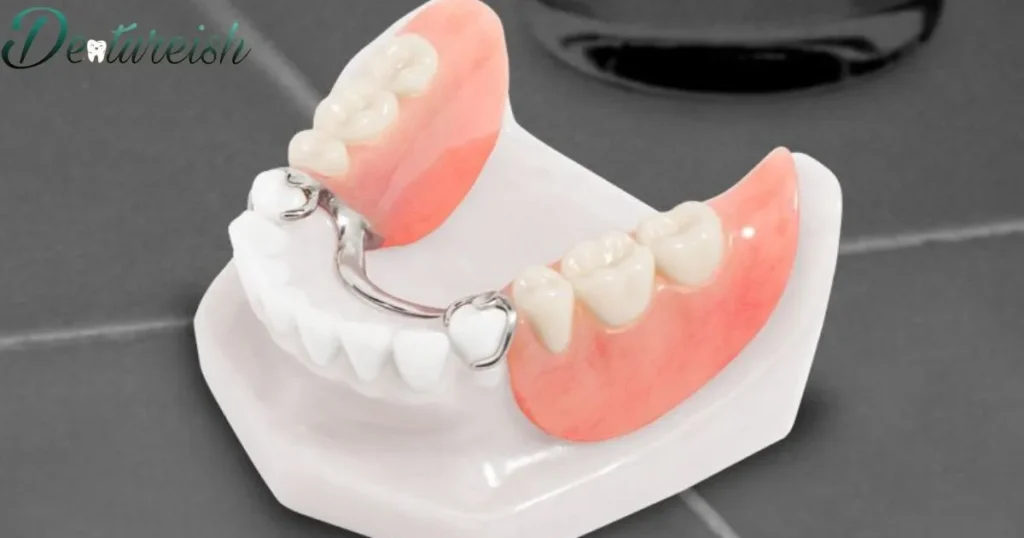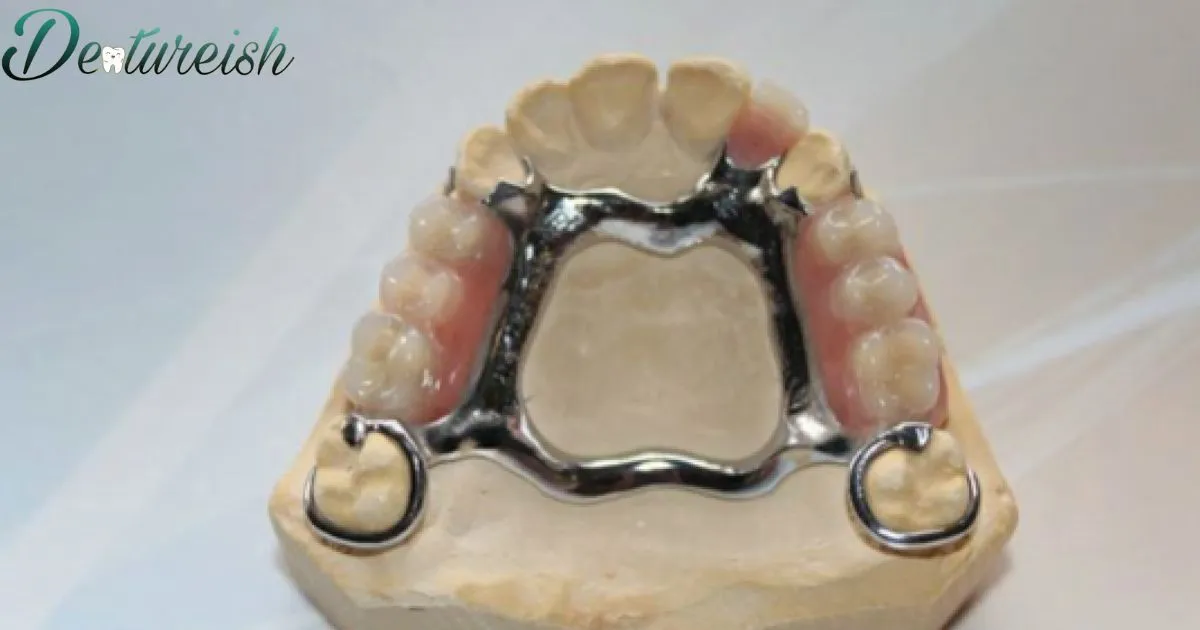Metal partial dentures are removable appliances that replace missing teeth using a metal framework lined with acrylic resin teeth. Proper cleaning is essential to remove plaque, stains, and odors. Soaking and brushing with specific cleansers helps disinfect and prevent deterioration of the metal components.
How to Clean Metal Partial Dentures? While crucial for oral health, cleaning metal partials can seem daunting. Misusing abrasives risks scratching the acrylic or eroding the metal substructure. A gentle routine using appropriate tools and solutions easily removes debris without damage.
Effective care requires using cleansers formulated for dentures and avoiding harsh scrubbing. After rinsing away food debris, metal partials can be soaked in an alkaline peroxide, enzymatic, or antimicrobial solution. Using a soft brush with the soaking solution, plaque and stains are gently removed. This method easily cleans acrylic and metal without abrasion. With simple daily cleaning and periodic deep cleaning, metal partials last longer and support better dental health.
Why Is Cleaning Metal Partial Dentures Important?
Proper cleaning of metal partial dentures is critical to prevent plaque buildup, maintain good oral health, and extend the longevity of the dentures. Plaque contains bacteria that can lead to bad breath, gum inflammation, and increased risk of tooth decay in any remaining natural teeth if allowed to accumulate on dentures. Regular cleaning keeps dentures functioning properly, comfortable to wear, and looking their best.
How does plaque buildup affect metal partial dentures?
Plaque buildup on metal partial dentures can lead to staining, bad breath, and irritation/inflammation of the gums. If left for too long, hardened plaque (tartar) can build up and make dentures uncomfortable and ill-fitting. The metal components are also susceptible to corrosion over time from acidic plaque, eventually compromising denture integrity.
What oral health problems can dirty metal partial dentures cause?
5 oral health problems dirty metal partial dentures can cause:
- Plaque and tartar buildup leading to gum inflammation, irritation, infection, and potential decay on natural teeth.
- Fungal infections like oral thrush due to bacteria and plaque accumulation under the denture metal clasps.
- Bad breath from the constant presence of bacteria, food debris, and plaque on unclean dentures.
- Stained or discolored dentures over time from plaque deposits that can be difficult to remove at home.
- Warping or further damage to the denture structure and replacement teeth if plaque is left to harden and buildup long-term.
It is imperative to clean partial dentures with metal meticulously each day, employing proper brushing techniques, utilizing soaking solutions, and scheduling occasional professional cleanings. This comprehensive approach ensures the longevity of the dentures and minimizes the risk of any detrimental effects on oral health.
How often should you clean metal partial dentures?

Metal partial dentures should be cleaned thoroughly at least once a day. It’s also important to rinse dentures after eating to remove food debris. Dentures should be soaked and brushed with a soft brush and non-abrasive denture cleaner to keep them free of plaque. At least once a week, dentures should be cleaned more thoroughly with soap and water.
What is the best way to clean metal partial dentures daily?
The most effective daily cleaning regimen involves removing dentures and gently brushing all surfaces with a soft brush and non-abrasive liquid soap or denture cleaner. Rinsing under cool water, taking care not to warp metal components with hot water. Allowing dentures to air dry to prevent bacterial growth before replacing them.
What Items Do You Need To Clean Metal Partial Dentures?
You need a soft-bristled toothbrush or denture brush, mild hand wash soap or detergent, denture cleaning tablets or solution, and lukewarm water to properly clean metal partial dentures. Do not use regular toothpaste as it is too abrasive, or products containing alcohol, bleach, or whiteners as these can damage the acrylic.
What type of toothbrush should you use for metal partial dentures?
Use a very soft toothbrush or specialized denture brush to clean metal partial dentures, not a regular medium or hard bristle toothbrush which could scratch the surface. The soft bristles are gentle enough to clean the denture without damaging it.
Should you use toothpaste or dental cleanser for metal partial dentures?
| Cleaning Product | Recommendation | Reason |
| Toothpaste | No | Too abrasive, risks damaging metal and acrylic |
| Denture Cleanser | Yes | Gentle, non-abrasive, made for cleaning dentures |
| Dish Soap | Acceptable | Cleans effectively but doesn’t disinfect |
| Denture Brush | Best | Ultra soft bristles avoid scratching |
As the sources indicate, dental professionals strongly advise using a specialty denture cleanser rather than regular toothpaste to properly care for metal partial dentures. Toothpaste can be too harsh and abrasive.
Denture cleanser solutions gently remove debris without wearing down the acrylic resin or metal components over repeated use. For best results, use a soft denture brush and non-abrasive cleanser.
Is warm water sufficient or do you need a soak solution too?
Warm water alone is not sufficient. Use denture soak solutions or denture cleaning tablets to fully clean metal partial dentures in addition to brushing. The soaking solutions help loosen debris and stains that brushing alone cannot remove.
Can you use whitening toothpaste with metal partial dentures?
Do not use whitening toothpastes or products containing bleach or whiteners with metal partial dentures. These products are too harsh and can actually damage the pink acrylic parts of the partial denture, turning them white over time. Use only non-abrasive cleansers.
Step-By-Step Guide To Brushing Metal Partial Dentures
Before brushing your metal partial denture, fill a sink with water or lay a towel down in case you drop the partial. Use lukewarm water and a soft-bristled toothbrush or denture brush with nonabrasive toothpaste or cleaner, brushing gently over all surfaces for 2-3 minutes. Pay extra attention to areas around clasps and teeth.
How should you prepare before brushing metal partial dentures?
Before brushing, remove your metal partial denture and fill a sink with water or lay down a soft towel to cushion a fall. Have ready a soft-bristled toothbrush or denture brush, nonabrasive toothpaste or cleaner, and lukewarm water to clean the partial.
What brushing technique works best for metal partial dentures?
Gently brush all surfaces of the metal partial denture for 2-3 minutes using short, gentle, circular motions. Take care around delicate clasps and teeth. Apply light pressure with a soft-bristled denture brush.
How long should you spend brushing metal partial dentures?
Spend at least 2-3 minutes gently brushing all surfaces of your metal partial denture with a soft brush and nonabrasive cleaner to effectively remove plaque and debris without damaging the partial.
Where should you focus brushing on metal partial dentures?
Focus brushing on areas around the metal clasps and false teeth, as plaque readily builds up there. Also pay attention to hard-to-reach surfaces between teeth and the pink acrylic base. Brush all surfaces gently but thoroughly.
Cleaning Between Teeth With Metal Partial Dentures

Interdental brushes are effective for cleaning between teeth with metal partial dentures. Their small brush heads allow you to gently clean around the clasps and metal framework of the partial denture. Be sure to use soft nylon interdental brushes rather than metal ones to avoid scratching the denture material. Water flossers can also help clean debris from around and under partial dentures with their pressurized water stream.
What interdental tools work for metal partial dentures?
Soft nylon interdental brushes and water flossers specifically are recommended for cleaning between teeth with metal partial dentures. Their design allows you to gently clean around the metal clasps and framework.
Regular floss should be avoided as it could get caught and damage the partial denture. Toothpicks and oral irrigators may also be too harsh on the metal and acrylic material.
How can flossing help clean metal partial dentures?
Floss should typically be avoided with metal partial dentures to prevent damage, but floss threaders may allow you to carefully get floss under the partial to clean debris. Looping the floss around each tooth and gently sliding it up and down can help clean plaque and food particles. Take care not to forcibly snap the floss down, which risks cracking the acrylic or bending the metal components.
Should you use mouthwash with metal partial dentures?
Yes, using an alcohol-free mouthwash twice daily is recommended for people with metal partial dentures. Mouthwash helps kill bacteria, reduce gum inflammation, and promote oral health similarly to natural teeth. But be sure to brush and clean between teeth first before using mouthwash. Avoid mouthwashes with alcohol as it can degrade acrylic dentures over time.
How often to clean between teeth with metal partial dentures?
Interdental cleaning with an interdental brush or water flosser should be done at least once per day, ideally after each meal if possible. This helps prevent plaque and food debris buildup that can lead to tooth decay, gum disease, and oral infections around the partial denture clasps and metal components over time. Thorough cleaning is key for long-lasting, well-fitting partial dentures.
Weekly Cleaning Regimen For Metal Partial Dentures
A weekly soak is an important part of cleaning metal partial dentures. This helps remove plaque buildup and stains that can accumulate over time. The metal components should be soaked in a denture cleaner solution formulated for metal dentures to avoid corrosion or tarnishing.
Why soak metal partial dentures weekly?
Metal partial dentures should be soaked on a weekly basis to thoroughly clean the metal components. Daily brushing may not fully remove plaque that adheres to the metal. A weekly soak helps lift stains and debris out of small spaces and prevents buildup over time.
What solutions can you soak metal partial dentures in?
Metal partial dentures should be soaked in a solution specifically designed for soaking metal dentures, not regular denture cleanser. These special solutions contain agents like sodium perborate that clean without being abrasive to the metal. Avoid solutions with bleaching agents that could corrode metal.
How long should you soak metal partial dentures?
Metal partial dentures only need to soak for 15-20 minutes in the metal denture soaking solution. This allows enough time for the solution to lift plaque and debris without risk of damage to metal components. Always follow the manufacturer’s recommendations for proper soaking times.
What’s the best way to store metal partial dentures overnight?
The best overnight storage method is to brush the partial dentures thoroughly before bed, then fully immerse them in cool clean water. Storing in water keeps the plastic and metal from warping or drying out. Be sure to use a covered denture case and store the partial out of reach of pets to prevent damage.
Frequently Asked Question
Can metal partial dentures be cleaned with regular toothpaste?
No, regular toothpaste is too abrasive for the metal and acrylic parts of partial dentures.
Should metal partial dentures be soaked in mouthwash?
Yes, swishing partial dentures in an antiseptic mouthwash helps kill bacteria and freshens them.
Can I use baking soda or vinegar to clean metal partial dentures?
No, acidic or abrasive homemade cleaners can damage the metal components over time.
Is it safe to use a ultrasonic cleaner for metal partial dentures?
Yes, an ultrasonic cleaner with water and denture cleaning solution safely vibrates away debris.
Do metal partial dentures require special brushing methods?
Yes, brush gently with a soft brush and non-abrasive paste to avoid damaging the metal parts.
Conclusion
Regular cleaning helps maintain metal partial dentures. Use a soft brush and cool water – never hot – to gently remove debris. Commercial cleansers made for metal dentures can soak appliances to lift stains without corroding metal. Avoid abrasives like bleach and alcohol that could scratch.
Be very gentle when brushing metal partials as components can bend. Daily removal lets gum tissue rest. See your dentist promptly if an ill-fit requires excessive denture adhesive, as realignment or replacement may be needed. Overall, gentle daily brushing plus weekly soaks in special solutions keeps metal partial dentures clean. Handle with care and proper storage protects the longevity of this dental appliance.

